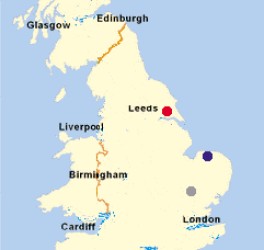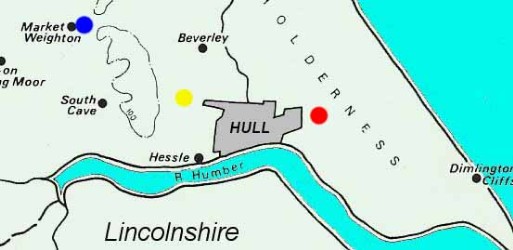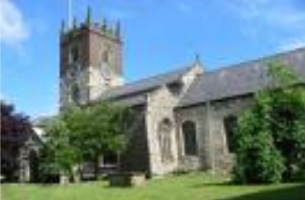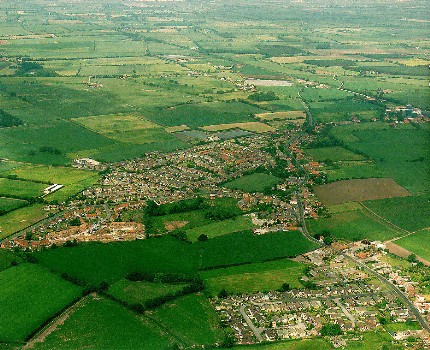

Above left, the red dot in the map of England approximates the location of Market Weighton in Yorkshire. Wighton in Norfolk is marked by the blue circle. Notice how much closer Yorkshire is to Scotland than Norfolk. Above right, a closer view. Market Weighton is marked with the blue circle. Nearby Little Weighton is the yellow circle, and Wyton is the red circle. Neither Little Weighton nor Wyton were part of the Wighton family history.


Above left, Market Weighton's All Saints Parish Church. Above right, the small town of Market Weighton is one of the main market towns in East Yorkshire and lies halfway between Hull and York, about 20 miles from either one. In 2001, the Market Weighton parish had a population of 5,212.
The Market Weighton web page reports that the town appeared in the Domesday Book in 1086 as Wicstun. However, archeological evidence reveals that there was some form of civilization in the area for at least 7,000 years. In 1251 the town was granted a royal charter by Henry 3rd and became a Market Town, with markets being held weekly on Thursdays. Market Weighton, like many other towns in the region, relied on its weekly markets and less frequent fairs to maintain its regional standing and prosperity. During the period 1700 - 1850, Market Weighton's September fair was said to be probably the greatest sheep fair in the kingdom with 70,000 to 80,000 animals annually exposed for sale.
Watts (2004) said that Market Weighton didn't adopt the Market part of its name until 1828. In fact, the name Wighton appeared periodically in its records between 1257 and 1678. For example, it was known as Wighton subtus Olde in 1553 and Wighton on the Woulde in 1569. This translates to something like Wighton on the Roman road. Watts also claimed that the source of the town's name was the Old English word wictun.
Mills (1998) adds other information on its early beginnings. As claimed on the town's web site, it was known as Wicstun in which form it appeared in the Domesday Book in 1068. According to Mills, this name refers to an early Roman-British settlement. He agreed with Watts that the Old English source name was Wictun and that the Market portion of the name didn't appear until the early 19th century.
However, Bulmer, writing in 1892, had a different opinion. He claimed that the town was previously called Weighton and that its name came from its location on the Roman road. Namely, Weg-tun or town on the way or road. As I understand Old English, the pronunciation of Weg-tun would still involve a {w?chtoon} sound, since the [g] and the [c] would produce the same {ch} sound before a following consonant. The vowel [e] might be pronounced slightly differently from the [i] we're used to seeing in our surname.) Bulmer noted that a man named Leland visited Weighton in the reign of Henry VIII. Since Henry VIII ruled from 1491 to 1547, that would put that variant of the town's name in use during at least some of that period. As we know from the previous pages, Weighton and Wighton were pronounced identically.
With there being some disagreement about the town's Anglo-Saxon origins, perhaps an analysis of the surnames found in Market Weighton's early records may help. These names were reported in Reaney (1991) and Watts (2004). In determining the pronunciation, I have used the guideline that any Market Weighton surname that is found in either Norfolk or in Scotland would be pronounced Weechtoon (as previously determined) and can be considered to be part of the Wighton family history.